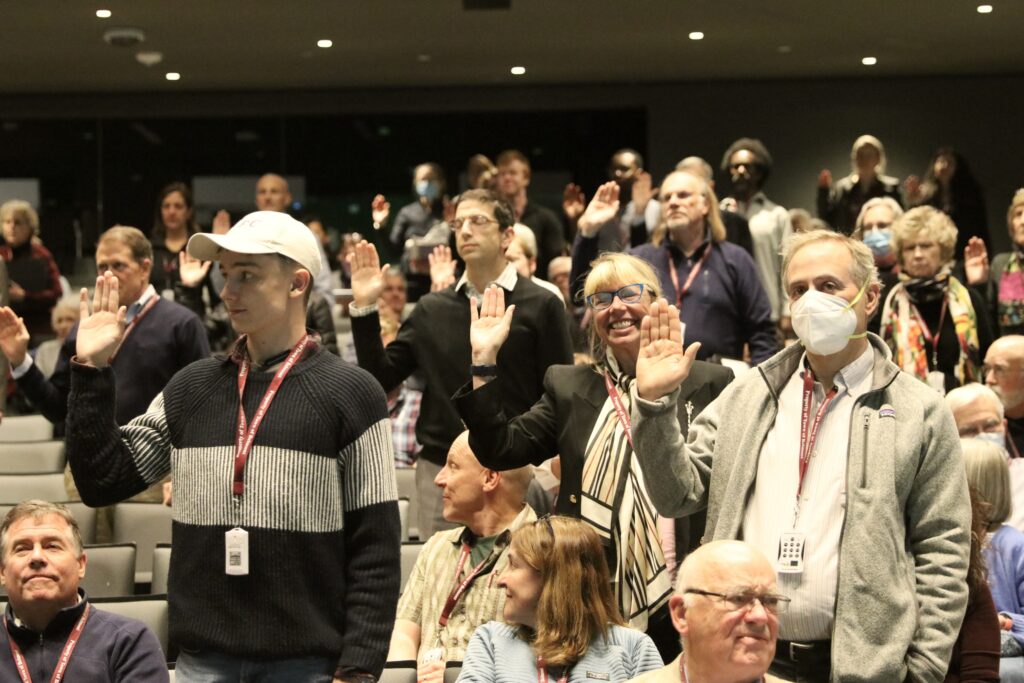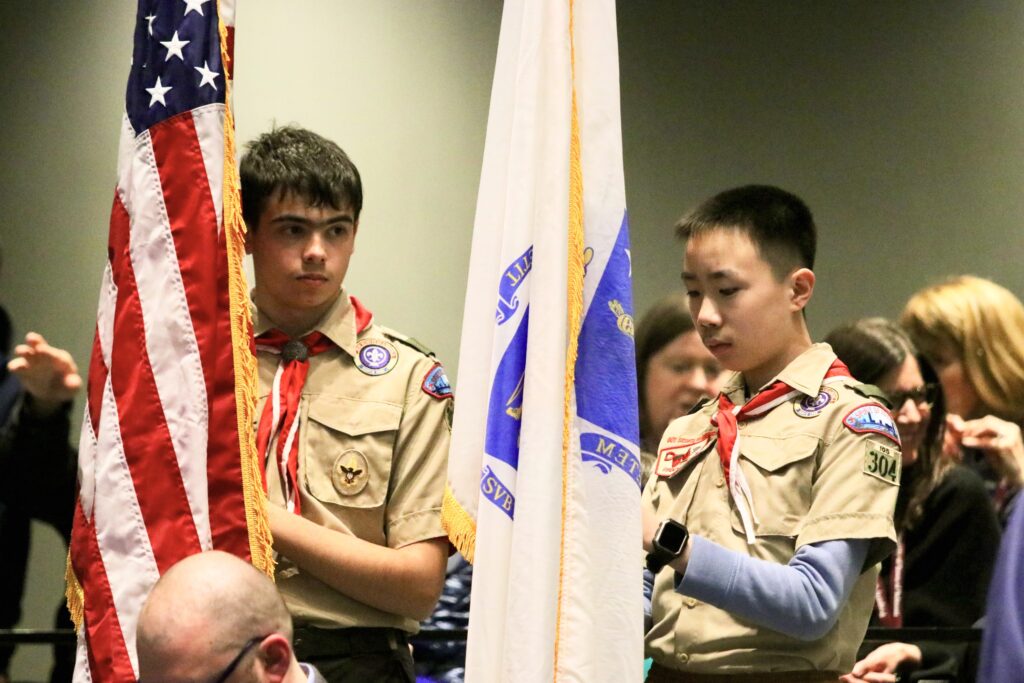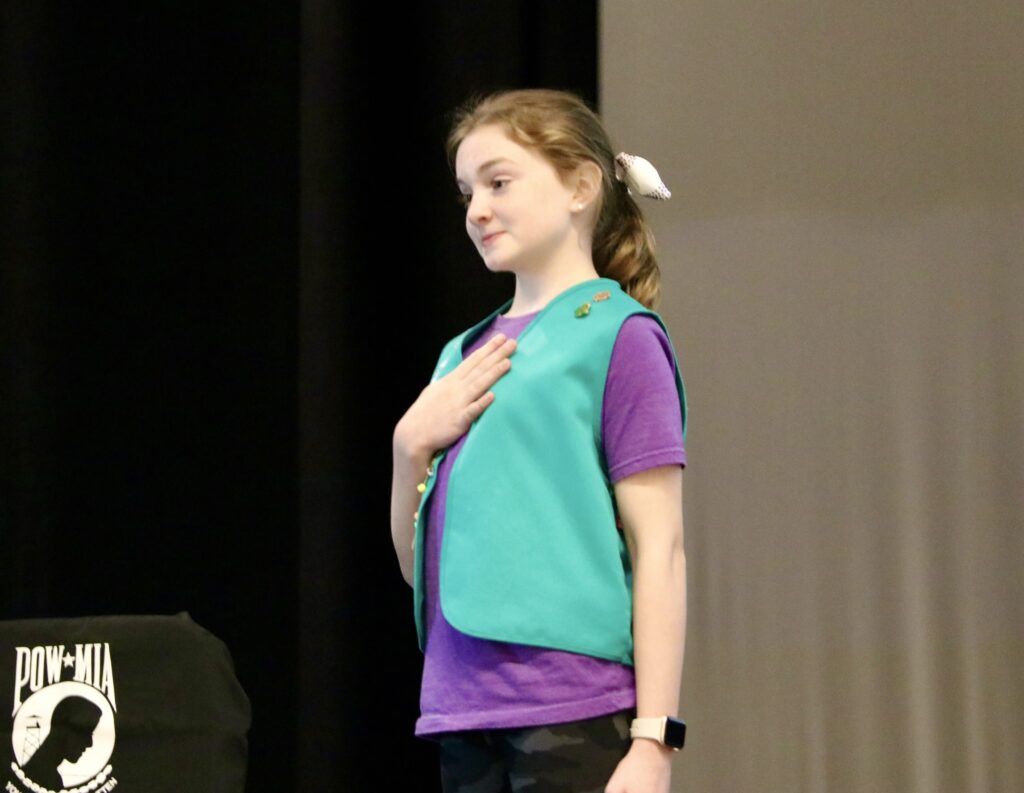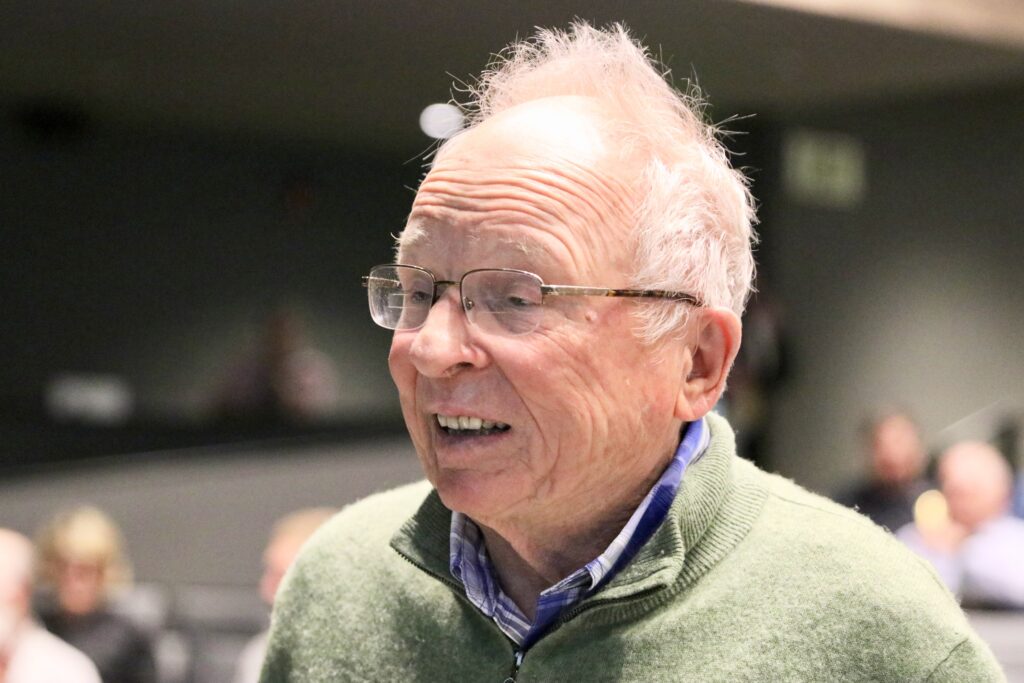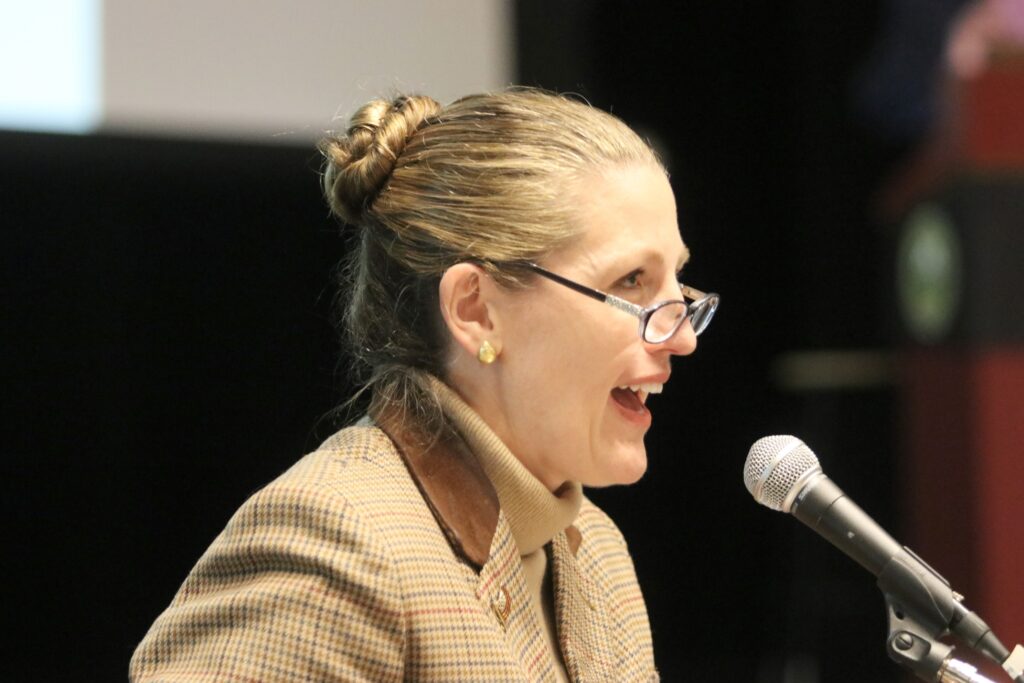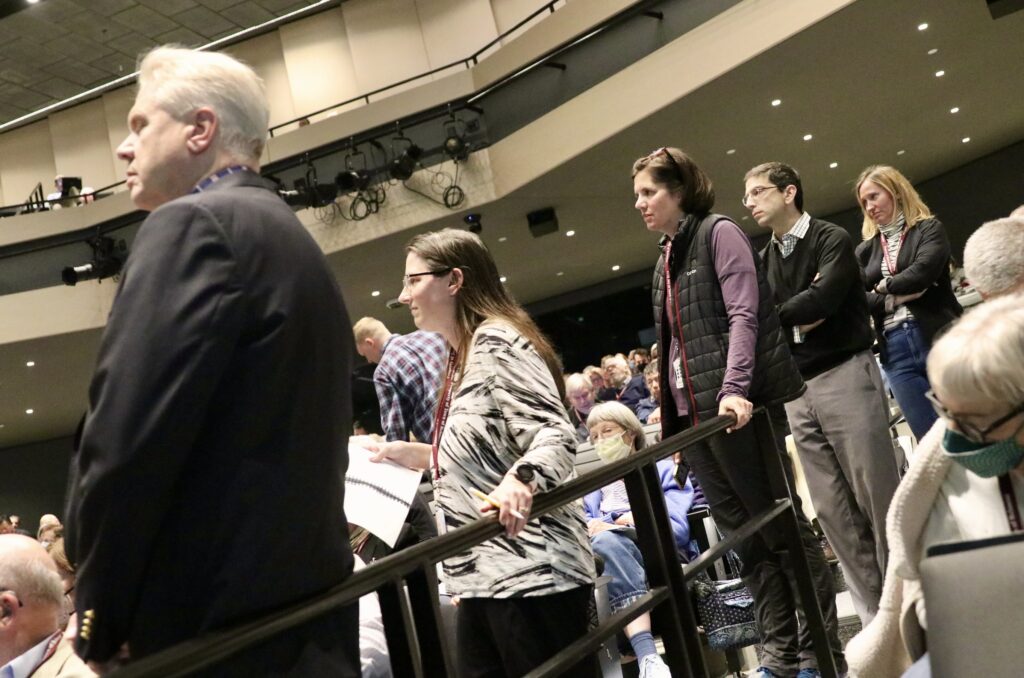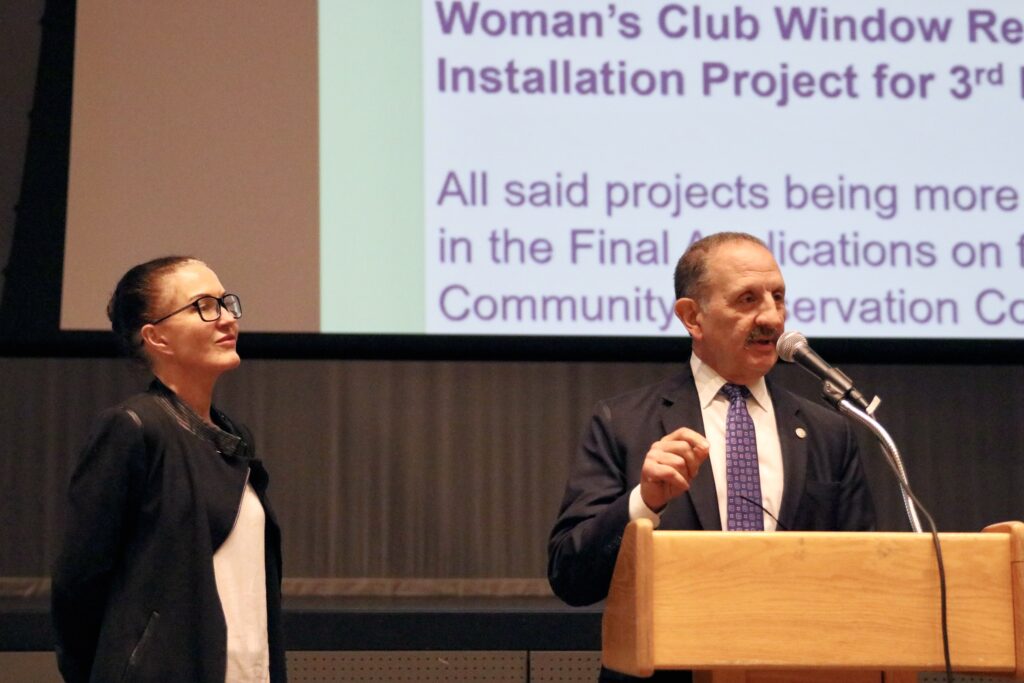Photo: With citizen petitioner Tomi Olsen listening, Select Board Chair Mark Paolillo speaks on the Town Meeting article on exempting nonprofit music events from town fees
The final two nights of the annual Town Meeting Segment A found members with little to get excited about – that’s expected to take place in Segment B – yet enough to keep busy with changes to bylaws and voting to allow the construction of a next-generation skating rink for the town.
At Wednesday’s meeting, the highlight was the passage to amend a bylaw that would clamp down vehicles that jut into the sidewalk, forcing pedestrians into the roadway to bypass the obstacle. Citizens Petitioner Gi Yoon-Huang, precinct 8, said the purpose of the bylaw “is to bring awareness to the town” that sidewalks are not an extension of a driveway and that vehicles can also obstruct sidewalks “and to educate the public” via “annual communications” about the law.
“By passing this petition, we are sending the message that we are prioritizing pedestrian safety over vehicles to the rest of the town and those enforcing them,” said Yoon-Huang.
While Town Meeting members were largely OK with the new bylaw – some questioned Belmont Police Chief James MacIsaac told the meeting he would be a little leery if his officers issued tickets under the new regulation as it goes beyond the existing Traffic Rules and Regulations, which allows the police to enforce 26 violations including speeding, parking, and obstructions. Unlike the regulations, the bylaw will require the police to identify who parked the vehicle to become an obstacle, which could be a drawback.
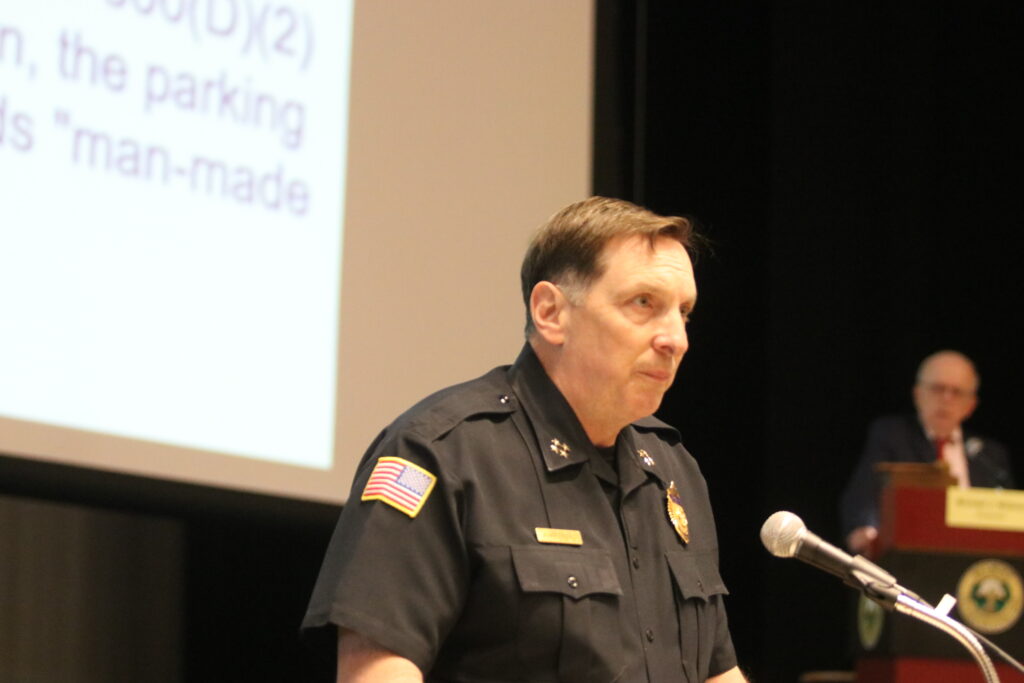
In addition, because the ticket is issued for violating a bylaw, anyone seeking to appeal the ticket has to do so before a Cambridge District Court magistrate rather than a traffic clerk. “If we start writing bylaw violations for parking tickets, I guarantee you I will hear back from the Cambridge District Court asking why [Belmont] is talking about backing up the process,” the chief said.
Speaking after the meeting, MacIsaac said “only the most persistent violators” would be fined under the newly worded bylaw, a sentiment that Yoon-Huang felt would be fair.
“I wanted this petition to be changing the culture and behavior” among residents rather than “another reason to ticket them,” said Yoon-Huang.
Despite concern from members who questioned the need for a bylaw reiterating existing regulations against obstructing the sidewalk, the article was easily adopted, 176-41-6.
Also, on the second night, the Meeting approved the authorization to borrow $28.7 million – which reflects $1.3 million in donations – to construct the new municipal skating rink. Town voters approved the debt exclusion at the April 4 annual town election with 61.7 percent approval after the measure was initially defeated in November by a 350 vote margin.
“The biggest thing I want to tell you is it’s not just a skating rink,” said Mark Haley, chair of the Municipal Rink Building Committee. “We’re creating a community center for high school sports and youth programs around the town.”
While most speakers congratulated the building committee for getting the project over the line by “sharpening our pencils” and reducing costs, others expressed apprehension that piling on debt with the rink and a new $32 million library approved in November could hamper the passage of a critical $9.5 million Proposition 2 1/2 vote due in April 2024.
“If we are facing a [fiscal] cliff after [an override] failure, the town’s elected representatives must be prepared to take responsibility for past votes and our votes tonight,” said Paul Gormisky, precinct 7.
But even those who opposed the rink would not thwart the will of the voters, and the article passed with a 200 vote margin, 210-9-1.
The highlight of the last night of Segment A was whether the legislative body would assist a resident who runs a beloved summer music festival from having to pay the fee for using town property.
Tomi Olsen, Precinct 5, is the founder and producer of the Payson Park Music Festival, which has hosted a dozen weekly performances during the summer for the past 32 years. But a long-standing bugaboo for Olsen has been the $75-hourly fee imposed by the town’s Recreation Department on events to provide clean-up services and maintenance.
“The amount of $1,120 may appear small, but in our budget, it is very substantial,” said Olsen. In the past two seasons, Olsen has not paid the PPMF fee; in 2021, Select Board Chair Mark Paolillo paid the tab, and 2022’s assessment was not picked up.
The original language in Olsen’s citizens’ petition would exempt all Belmont-based non-profit organizations from paying the hourly fee for using public lands as those entities provide a common good to the community.”
But in the run-up to Town Meeting, Olsen’s petition was barely treading water. The Select Board, Warrant Committee, and everyone else was lining up against the measure as it would allow more than 300 non-profits “residing” in Belmont to use space in town parks and land rent-free.
In a last-minute attempt to narrow the number of entities that would warrant a discount, Olsen submitted an amendment at the town-imposed deadline for revising articles. Working with the Bylaw Review Committee, the newly worded article – presented to the Select Board three hours before the start of the Town Meeting – whittled down the exemption to music-oriented non-profits producing free-fee concerts, which left only a pair of popular and well-attended musical events: PPMF and Porchfest.
But the Select Board was having none of that. At the board’s meeting preceding Monday’s assembly, Select Board Chair Mark Paolillo put the hammer down on both the late submittal of the amendment and what he and the board believed were “significant” changes to the article, explicitly adding the word “musical” to the article.
In a rare move, the board sent for Town Moderator Mike Widmer to attend the pre-Meeting Select Board confab to explain and defend the amendment.
Upon hearing the Select Board’s displeasure, Olsen attempted an end run around the stubborn opposition to the article by requesting a postponement of the debate and vote until the start of Segment B – which begins May 31 – allowing the amended article a chance to circulate in an attempt to garner support.
But facing a contentious and bustling budget segment, most Town Meeting demanded a final up-or-down on Olsen’s article by voting down the proposed postponement, 40-175-4.
Despite town committees and boards voting unanimously unfavorable action to her proposal, Olsen put on a brave face and questioned why the festival and Porchfest should be burdened
“If these gifts of talent can be provided for free-for-all by these non-profits, why wouldn’t we as a town want to help by waiving such a small fee for the town?” said Olsen.
While all who spoke praised the festival and promised to donate to it, members said they didn’t want to set the precedent of carving out a special exemption for the festival or any other worthy cause in the future.
Members also pointed out that Olsen has other options to reduce the PPMF’s financial burden. Recreation Department Director Brendan Fitz acknowledged his office has an existing mechanism in which individuals or non-profits can request reductions of payments, “which happens quite regularly.”
The last-second changes didn’t convince many to come to Olsen’s side, as the article was defeated 41-174-3.
Earlier in the evening, Town Meeting approved authorizing 10-year terms for town leases and procurement agreements for electric vehicles, expanding from the current state-approved three-year term. The article will allow a greater option to purchase large electric vehicles with an eye on the next generation of school buses. Since there are environmental and costs advantages to accepting the measure, Town Meeting gave the article a big thumbs up, 212-5-5
On the final article of the night, the meeting found itself scratching its collective heads when it came to the seemingly innocuous request for a property easement to allow the approved Subaru expansion along Pleasant Street to proceed. The original article used standard boilerplate language for granting all the necessary infrastructure changes for development.
What caused the article to become a glorious gallimaufry was a Substitute for the Main Motion authored by Robert McGaw, precinct 1, which town officials described as an exercise in heavy-handed “redlining” copyediting. But beyond that, they couldn’t say why the amendment was necessary. McGaw’s rewrite didn’t alter the easement’s purpose or make the article any more understandable to the members.
“Speaking for myself, and I think also for my colleagues, we were mystified, wondering what changed with this amendment. As far as I can tell, nothing has changed,” said the Select Board’s Roy Epstein.
But, as Epstein pointed out, the amendment did have real-world implications “because I can tell you a lot of time was devoted by town staff, Town Counsel – at some expense – and by the Select Board to evaluate this amendment to seemingly no purpose.”
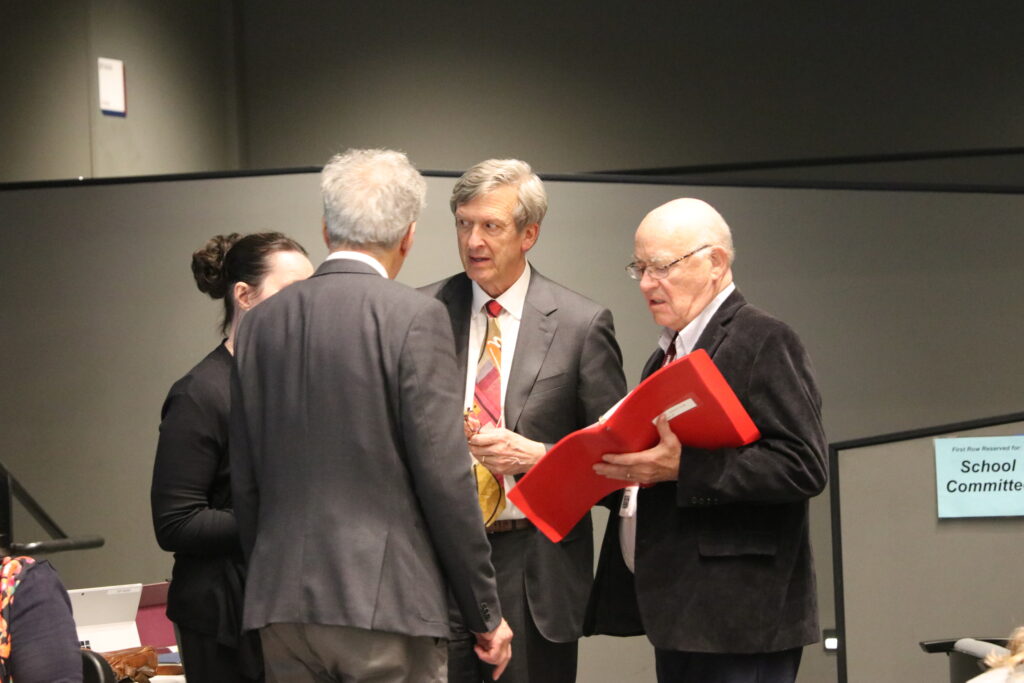
At this moment, McGaw and Town Moderator Mike Widmer could not agree on which of the versions of the amendment the meeting would be voting on. The process became so muddled that Widmer called for a five-minute break as Town Counsel George Hall, Garvin, McGaw, and Epstein held a sidebar that got a tad animated at one point. When all was said and done, the Select Board decided it was best to move on and accept the amendment as “red.”
Director of the Office of Community Development Glen Clancy did his usual masterful job explaining the need for the easement to the assembly, which garnered not a single question. After passing with a handful of no’s, a second vote was required due to some “confusion” on what version the body was being polled. The article finally passed 207-0-2. Whew.
Town Meeting will return on May 31 with Segment B, the budget portion of the annual meeting.
